Inspiring Games is the company behind Legends Untold, a cooperative adventure game with the speed of a card game, minimal setup, zero downtime, yet the depth of an RPG. Kevin and Hugh are the masterminds behind it, and were kind enough to talk to me about it and their upcoming game, Lord of the Horde, at the recent UK Games Expo. In a hotel bar. Late at night.
Hugh and I go way to back to LARPing and other gaming activities back in our university days (I did say way back.) I pledged to the Legends Untold Kickstarter, and helped demo the games a couple of times at conventions such as Dragonmeet and UK Games Expo, but each time the game had evolved dramatically.
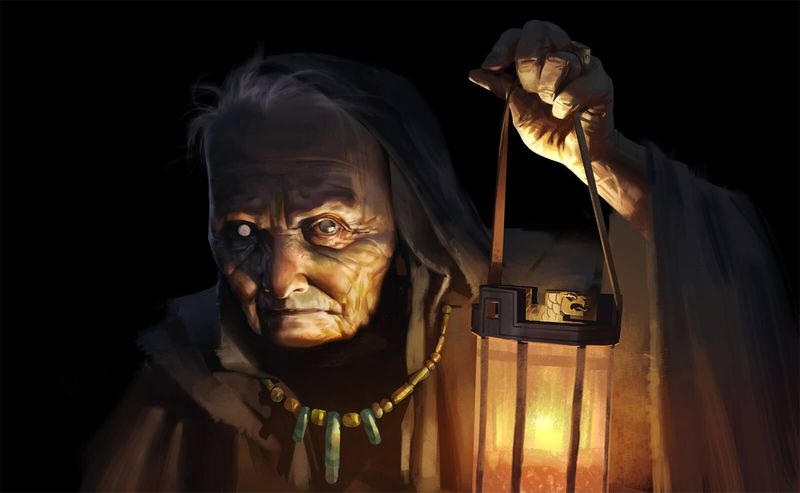
Mottokrosh: I am here with Kevin and Hugh from Inspiring Games—thanks very much for talking to me. It seems like a name that should have been taken already. How did you find it, how come it wasn’t taken?
Hugh: I can’t remember.
Kevin: We spent forever coming up with a name. And I think the running joke was why don’t we just have Something Adjective Games? ‘Cause we tried everything around that word. And the original one we were going to go with was actually Urgency Games.
Hugh: It was one Kevin liked, but I was against.
Kevin: But then everyone pointed out that it makes you feel like I want to go for a pee.
Mottokrosh: Ah yeah, I understand.
Kevin: Joking apart, basically what we were advised to do was go and find some website, find a domain name you can nab, and take the name from there. And to be frank, the best one we could find was Inspiring Games.
Mottokrosh: And InspiringGames.com is the website, great. Wow. Alright. So, I believe, if I remember correctly—because this was a while ago—in the kickstarter you said something that you wanted to make a game that was for the modern gamer, who doesn’t necessarily have as much time anymore as they did during their university days.
Hugh: That is what Kev said.
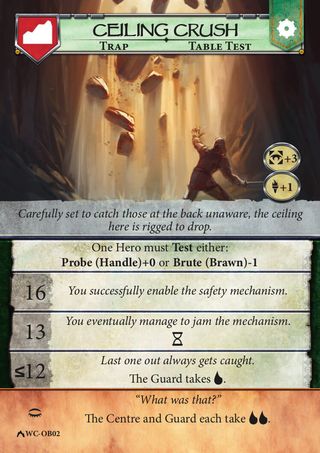
Kevin: Yeah that is what I said yes.
Mottokrosh: Is that true?
Kevin: 50% of it was designed for that.
Hugh: I just like designing games, Kev had an idea for a game and that’s what we went with. For our first game we tried to do an in depth and detailed dungeon crawl as Kev had some ideas behind that and we just built it from there.
Mottokrosh: Okay.
Kevin: So it seemed. Though it’s a very much a joint baby, Legends Untold. I worked with Hugh and we started off with an idea of "wouldn’t it be cool to do an RPG lite", the original working name was R0 - RPG Lite, and after we played it, Hugh and I both thought there were some legs behind this and it was a lot of fun. And then we had a construct of what worked and that gave us what we needed to do, and then added more depth into it until we got to a point of where we had to say, “That’s enough!” “We’re there!”. And I still pushed a little beyond that boundary.
Hugh: So Kev has a vast number of ideas of how we can build into the game, and my job is mostly to find out what ones actually work within the game, and worked within the game without having a thousand counters, or a big pile of dice. The idea behind it was, what game can we fit into about 110 cards? So the basis was what game can we build for those kind of cards for our first game, which would be the most cost effective way of building the game if those kind of decks of cards, what can we do within that?
Mottokrosh: Yep. Okay, so you had some physical or financial constraints there, and you had that initial idea of a roleplay-like, but that would be quite quick to run. Do you think from that focus, it went there all the way? Or because as you said, you kept on adding stuff, is it still...
Hugh: The idea very much at the start, was let’s have a game for people who don’t have much time. Who want to run a roleplaying game but therefore want to play a game for about an hour. On their own or with a few friends, ‘cause there’s never enough Dungeon Masters around to run this kind of game, so what can they find to play a game in about an hour? So we kind of deconstructed that backwards. So, you know, if a dungeon is going to have 6-7 rooms in it, then each room has to be done in about 5 or 10 minutes, if you’re going to play through 6 rooms in about an hour. We worked our way backwards from “if this is what we’re trying to do, then what can we do in the time?”
Kevin: And we’re still true to that today. In fact I was giving that very speech that Hugh’s just given. It’s the Ikea concept of "they start from the packaging," and we started from those, I think I said, 9 rooms, 5 minutes per room, 45 minutes. And this is why one combat takes 1 minute roughly.
Hugh: 2 minutes.
Kevin: OK, 2 minutes.
Mottokrosh: Depends, I think, on whether there is range units as well.
All: Yeah, yeah.
Kevin: Super quick though.
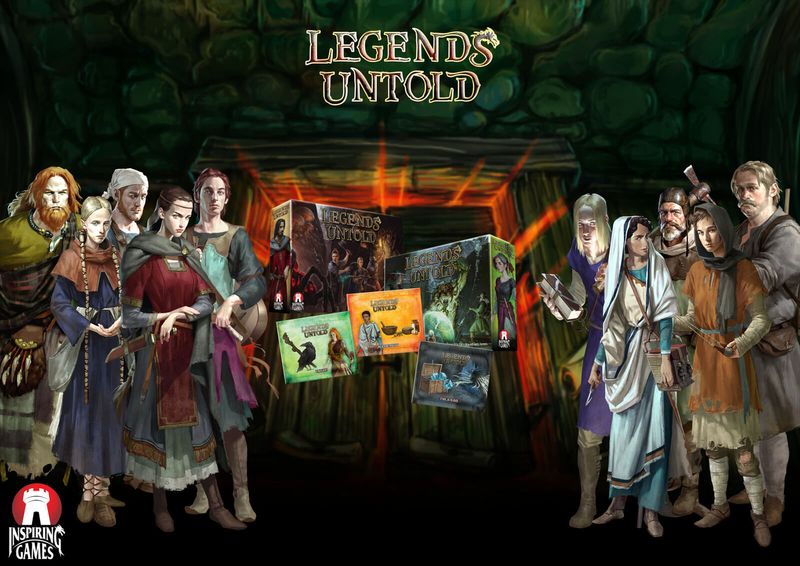
Mottokrosh: So as the game evolved, because there has been many iterations from what I gather—I’ve played several of them—did you find there was some emergent behaviour coming out that you hadn’t really foreseen in the beginning?
Kevin: Hugh’s always been very true to “this is the design, this is how it should work” and rightly so. He challenges me with “Okay do we really need to add this?” and then we have a debate about it and try to explain why it would be cool to include for the backers, and to be fair, Hugh usually figures out a way to doing it without having to add so much to the game usually.
Hugh: I like to build a little bit more on what we have, rather than to cram in more mechanics. Like I said, we already have mechanics that do most of this. A good example of that was the shield mechanic, prescribed for the apprentice. As Kev wanted the shield to do more, it reduces your modifiers to hit. That would be a very boring way of using shields.
Mottokrosh: Yeah.
Hugh: So Kev is into his history, he knows very much how Viking shields work, Celtic shields work, how Roman shields work. How they all work differently. So he wanted a mechanic where there’s “oh you have fatigue points” and they use the shields and gain fatigue points. I pointed out that you already have that. You have talents which you exhaust, and when that tends to exhaust you have nothing more to do, so a shield now would now allow you to exhaust your other talents to do stuff with. So reusing the mechanics that were there, building things into that, for me that is what I like to do the best. To make it the most efficient and smooth running as possible. Use what we already have.
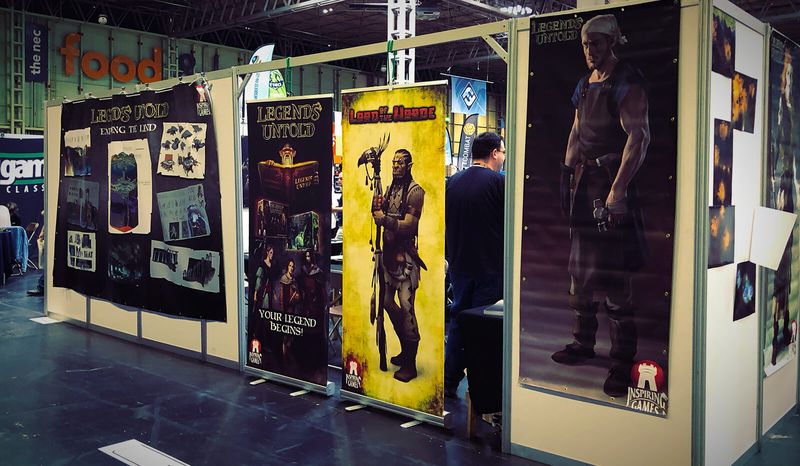
Mottokrosh: That sounds great. So moving away a little bit from the mechanics of it, you’ve got a lot of lore around that as well.
Hugh: I’m pointing at Kev here.
Kevin: Yeah it’s, it’s mostly my baby. I do very much encourage Hugh to get involved and Hugh does come up with some cool ideas about the Brethren, the dwarves, who, in Mor Nadar are the dominant race. Hugh came up with the whole idea of Brethren martial arts. Would it be cool if he had a kind of, we call it “Brethren fu”, a dwarf martial art fight thing? And that was then developed into something much bigger.
Mottokrosh: So the Brethren are the dwarves?
Kevin: Yeah the Brethren are the dwarves and these are the aged, venerable race who as a conceit, actually speak contemporary British English, it’s very handy.
Mottokrosh: Laughter.
Kevin: And that is how we get away with explaining everything in game in contemporary British English.
Mottokrosh: Right.
Hugh: And the Brethren were like the lore keepers. They tell the stories that we’ve written so therefore they were in English.
Mottokrosh: Ah okay, that’s nice.
Kevin: So that’s why we’re okay to try to pimp our second game a little bit on your interview. Lord of the Horde, the next part of course...
Mottokrosh: I was going to get to that in a moment!
Kevin: It’s all about the orcs.
Mottokrosh: That seems kind of hard on the dwarves though, Lord of the Horde. With hordes of orcs just trying to…
Kevin: Well it’s no guarantee the orcs win though, right, in the current game?
Mottokrosh: No, there’s a lot of infighting and that.
Hugh: There was a change early on. On, like, what are orcs? Can we make the orcs different from your typical dwarves? Can we made the orcs different orcs? Can we make the orcs shorter, and stouter and have beards and pale skin? But then they’re really dwarves now and not orcs. So we can make them different, but we can’t make them too different without them losing their typical fantasy stereotype.
Mottokrosh: Yeah. So, but the dwarves are called the Brethren. So does this mean there are no female dwarves?
Kevin: Not at all, it’s just we wanted to give us a cool way of making it feel that there is a much more mystique and uniqueness to the world, but also a certain familiarity. For example the elves: you’ll notice in our game they’re actually called the “Newcomers” because, literally, they have just arrived.
Mottokrosh: Ah, I was wondering who the Newcomers were, I was wondering whether that was a short cut. Like someone’s invading, we don’t care, they’re just The Newcomers.
Kevin: You’re right, because they’ve only just figured out what—people have only just figured out who they were five years ago in Legends Untold, and that’s The Newcomers. But we’ve got a different take on it.
Mottokrosh: And the orcs?
So the orcs will be a venerable race, and they, pretty much like the dwarves really, they’re dying out and there aren’t very many of them left, in Legends Untold. But in Lord of the Horde they are very much the dominant race, 4000 years prior to that. The Newcomers, are the guys that have just come onto the scene, they are our equivalent of, we take a mixture of, for your readers, Norman knights, Samurai and elves. Bang that all together, they become bigger than humans, add on chainmail...
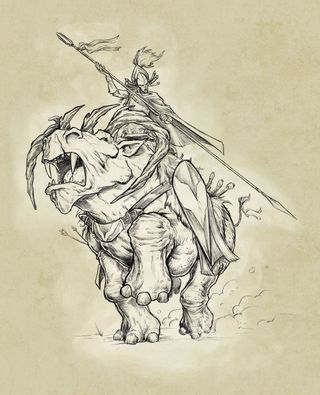
Mottokrosh: Have you got any art for those of them in there?
Hugh: We have Newcomer knights in the Sewer set. They have magic and heavy armor.
Kevin: That’s actually a good example of how Hugh and I work together. Because it was something that we didn’t have to add into the game, yeah, and quite often we will go, "we like that idea, but is it too much?" But when I ran it past Hugh, we actually felt that we can do that fairly easily, and we’re giving the backers something really cool for the game as well.
Mottokrosh: Yeah, and talking about the art, I must say that the art is amazing and it’s gone through various iterations as well. You’ve even replaced art that you’d already commissioned in places.
Hugh: So when we were at the UK Games Expo 2016 the art looked pretty terrible, it's what we could cobble together on the cheap.
Kevin: With Kevin’s graphic design.
Hugh: Yeah with Kevin’s graphic design. We were told, the game is great, but the art looks terrible and you’ll never sell this on Kickstarter. So we put lots of money—and by "we," I mean mostly Kevin—put lots of his money into finding the art basically to get it to Kickstarter. Good enough for Kickstarter people to say "yes, we like the idea, and it looks really pretty." And then we took, because we did well on Kickstarter, we took a lot of that money and re-invested it in making the art looking fantastic. Because, you know, in the end you want something that looks really good.
Mottokrosh: What was your process for like finding the artists? Was it people you already knew, or…
Kevin: So no, no. I was asking other publishers that I know, other indie publishers. And Hugh’s right, the reason we did it is that everyone said you’ve got a cool game, but if you want to have a chance at retail, you have to get the best art.
Mottokrosh: It’s true. It’s quite amazing, because Kickstarter is now like, like a shop. At first it was like, if there’s a game on there, I’m going to back it. Now it’s like if you want your game to stand out, you have to visually stand out to begin with.
Kevin: So the artists we used, although we advertised, there’s a page we used that anyone can use if they’re interested, it’s called ConceptArt.org. Which is kind of like DeviantArt for professionals. Because with DeviantArt, we’ve got a couple of artists from there, but it’s very easy to get frustrated.
Mottokrosh: It is, it’s like a huge sea of...
Kevin: You get a lot of applications of, and you’ll say...
Mottokrosh: Huge range of skill there.
Kevin: Yeah. So ConceptArt.org have professionals on there who will send you their portfolios, from illustrators to support, and we got a portfolio of a dozen artists. I was actually being asked this very question today and had another artist approach me. So I’ve just said "send me your portfolio and we’ll have a look". Because what we do is, we put them into different areas. We have character artists, for the characters for Legends Untold and Lord of the Horde. We have scenery artists for sets for Lord of the Horde and the location cards for Legends Untold, and we have small assets artists for weapons.
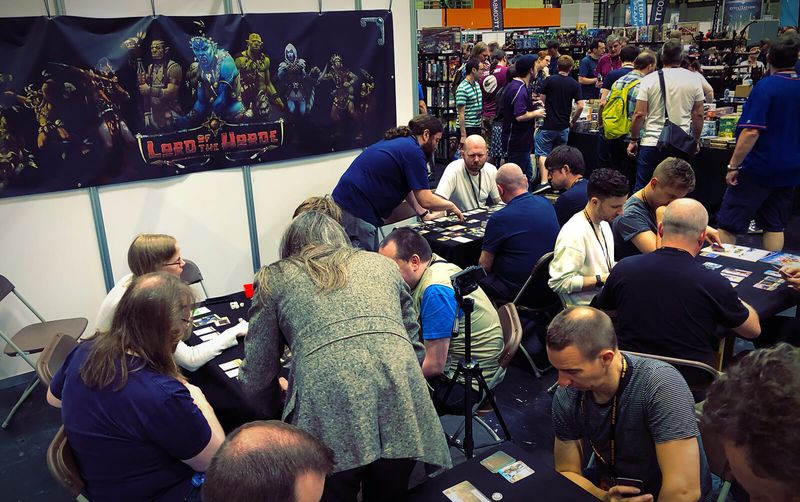
Mottokrosh: Let’s go back quickly to the lore thing and talk about the names. We briefly touched on Brethren. Which erm, which is a word. But you have a lot of names like the Sax, the Celti. Both of which seem like shortening of existing things. You also have things like the Gnimshka, Dun Mordhain and things like that. Where do all those names come from? Are they basically just based on real life languages?
Kevin: They come out of my head, well that’s probably what Hugh’s thinking. But there is a science behind it. In that, unless the word is the in the native tongue, such as Dun Mordhain, which is effectively almost gaelic for “city on the big hill,” a lot of the Celti words are in gaelic. But we don’t always choose Scottish gaelic, we choose any celtic language. Sometimes it’ll be a Manx word or a Breton word, and we also put in the English equivalent. Remembering that the English equivalent is the Brethren okay? So the English equivalent for the biggest mountain over to the East, in Legends Untold is Evermist. And the Celti word for it is Aes Nu. Which is I think from memory a mixture of Manx and Cornish. It’s just what we do.
Mottokrosh: Laughter.
Kevin: So we do not claim to be J. R. R. Tolkien in any way.
Mottokrosh: I mean one of the things about this—to have these slight variations— is it’s easy to associate in your head as well.
Kevin: And you know what, the reasons for coming up with these words for the Celti and so forth is partly because they are meant to be a construct of several civilizations together. So the Celti themselves are meant to be half Gaul from ancient Rome and also part Celt and Scot and Pict together. So a constructive name. But the Brethren like to add on the end of a foreign name. That’s why you have the Celti and so forth.
Hugh: Having names like the Sax and the Celti gives you something to hang onto so you don’t…—It gives you indications that it’s like this, but slightly different.
Kevin: It’s Saxonish. If that makes sense.
Mottokrosh: Saxonish. Cool.
Kevin: So on the big map, for Lord of the Horde we show off a lot more of the other cultures from four thousand years ago. These are the embryonic main future cultures. So you have Ta-Akhet, which is the Land of the Horizon to the north of Aegypt, which is Egypt. And you have the Pelasgi, which is the forerunner of ancient Greece. And various other places. In fact we had some Greek visitors round today who knew the game and they wanted to see the map. And when I showed them all, they got what I’d done. They totally got it. They said “Oh that’s Crete isn’t it?” I said “Yeah, that’s Crete.”
Mottokrosh: So since you’ve already got this big map of these various locations and Legends Untold is centered around Dun Mordhain, and you’ve got Lord Of The Horde, your upcoming one centered around a location that I don’t know the name of...
Kevin: The Brethren Realms.
Hugh: The Brethren Realms.
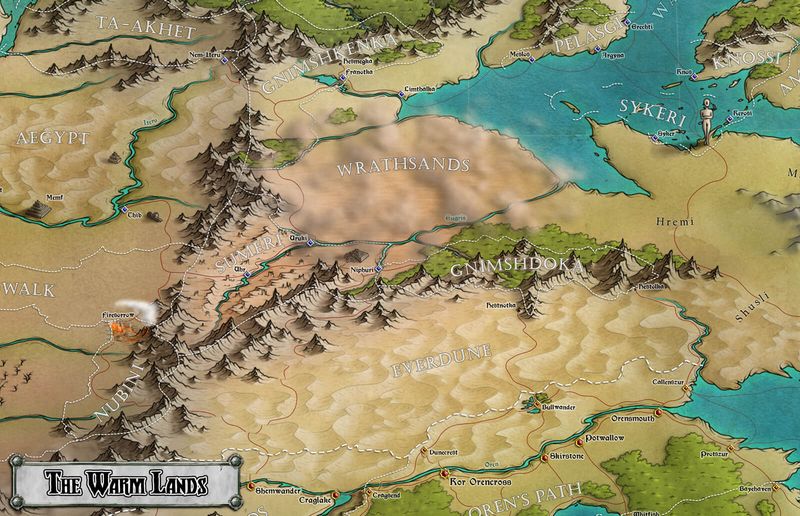
Mottokrosh: I was going to say something related to the Brethrens. Are you planning on placing games in a variety of places? Is that the big master plan? Cover all of your map in games?
Hugh: Yes.
Mottokrosh: Yes!
Hugh: And yes, and in different games though. You know, Legends Untold is a cooperative adventure game, Lord Of The Horde is a card based battle game. Where you compete for dominance over the other orcish tribes. We have other ideas to go along, with the Brethren and their first steps into the world, what they did to expand… There are lots of ideas for very different games in a variety of different places but all of which enhance the overall idea of the world.
Mottokrosh: Nice.
Kevin: So you could have a Legends of the Newcomers for example, Legends of the Gnimshka, and Legends of the Brethern etc.
Mottokrosh: And are you planning on releasing these games on Kickstarter? Or in other ways? Do you even have plans for that yet?
Hugh: We have many ideas. Wouldn’t go so far as to say they’re plans, but ideas perhaps, that’s all. It’s the time and the money, and there’s only a couple of us and that’s about it.
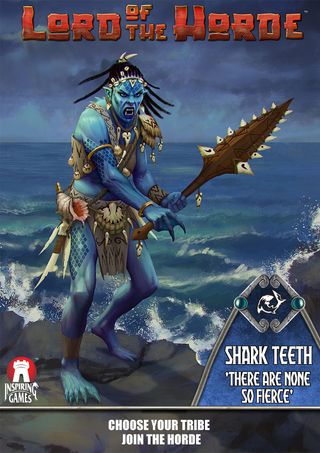
Mottokrosh: But Lord of the Horde is the next one—are you planning on Kickstarting that?
Kevin: We’re hoping to do that next year, but first comes another Legends Untold expansion: A Step Into Darkness. Lord of the Horde is Hugh’s baby—most of my input has been world building, and the lore and the art direction, rather than the actual mechanics of the game. That’s Hugh’s baby very much.
Hugh: Lord Of The Horde started with orcs vs humans and it was quite different. Then it turned into "can we do it with dwarves?" Orcs vs dwarves? And then it was "well, it would be good if we had more orcs." We started with four or five orcs types and we ended up with twenty-two.
Mottokrosh: I want to end on a completely different question. Are they any other upcoming games, Kickstarter or otherwise, that you guys are particularly looking forward to?
Kevin: That’s a good question. For me I’m particularly looking forward to a game called UBoat, which is a submarine based cooperative game. Where you get to effectively manage the submarine, and you’ve got to manage the sanity of the group. I’ll be honest, I’m particularly interested in this because our plan is to ultimately launch a game where you guys cooperatively man a titan. That’s it basically.
Mottokrosh: And what about you, Hugh?
Hugh: The only game I’m looking forward to at the moment is Adeptus Titanicus. Mostly because I like the old school epic stuff. But that’s mainly not coming out for awhile. But for very different reasons again.
Mottokrosh: Thank you very much guys. And all the best with Inspiring Games.
